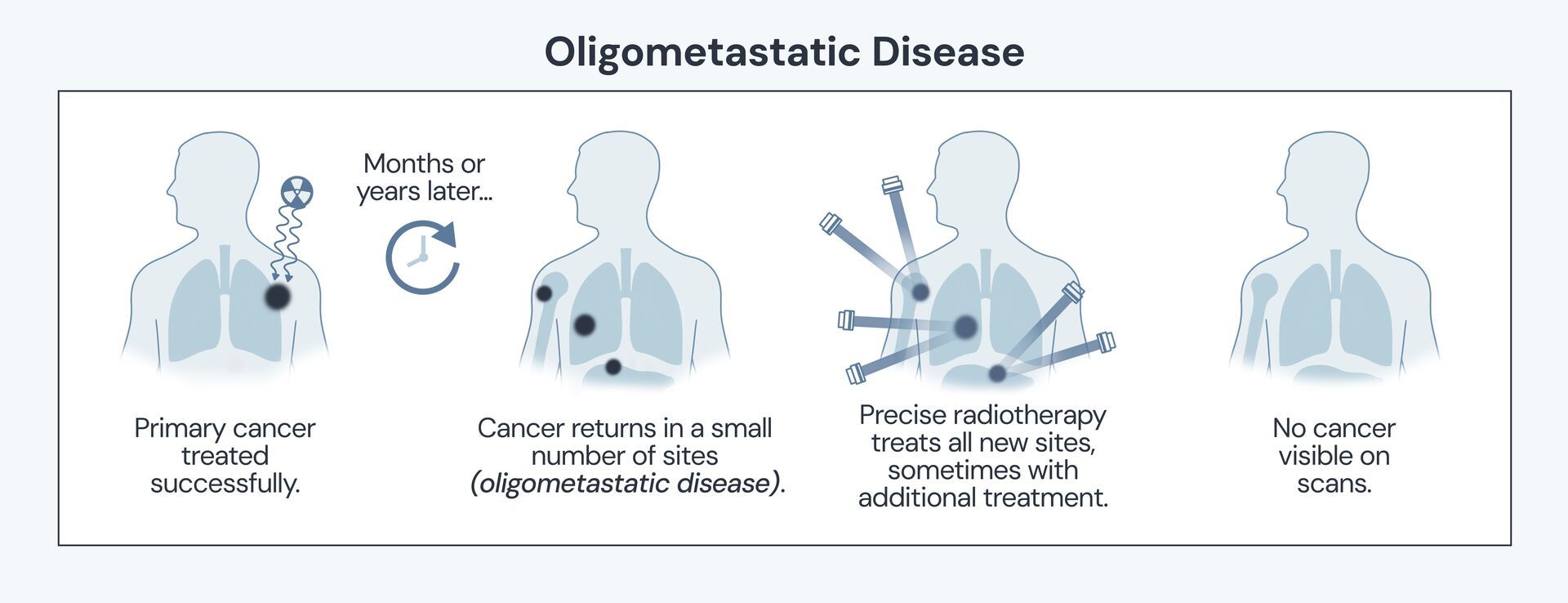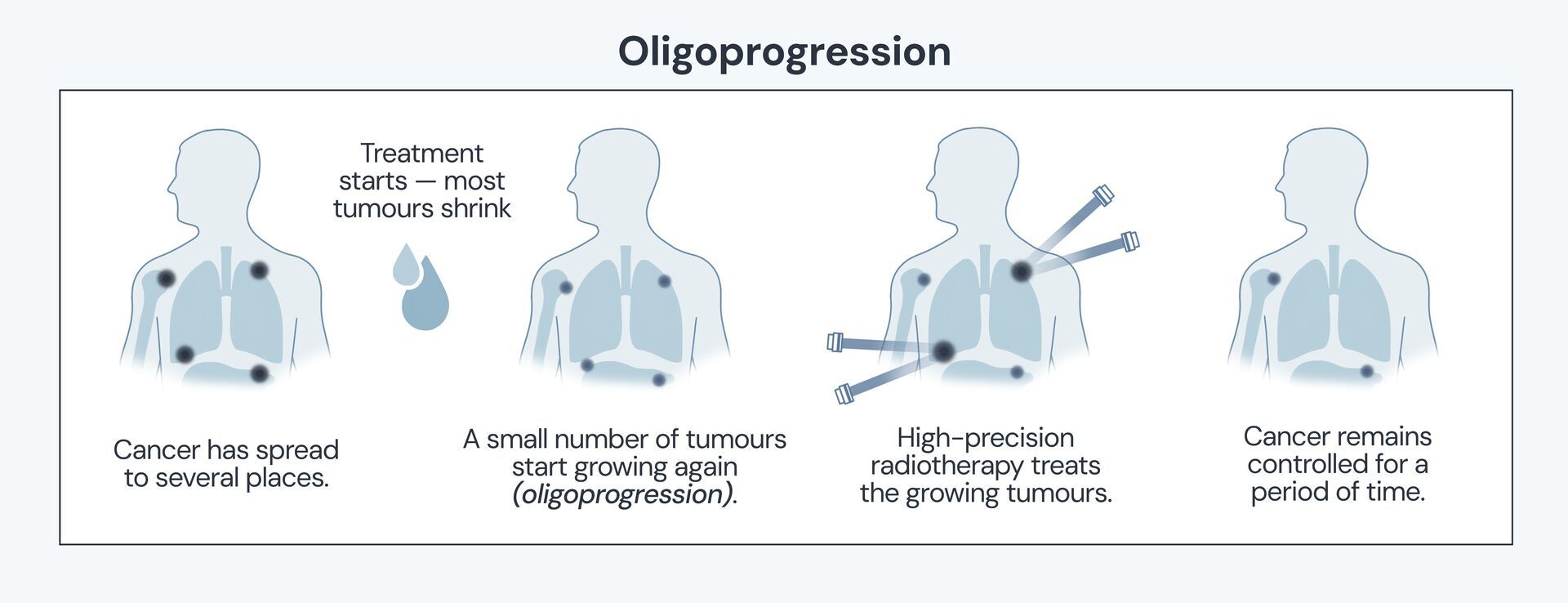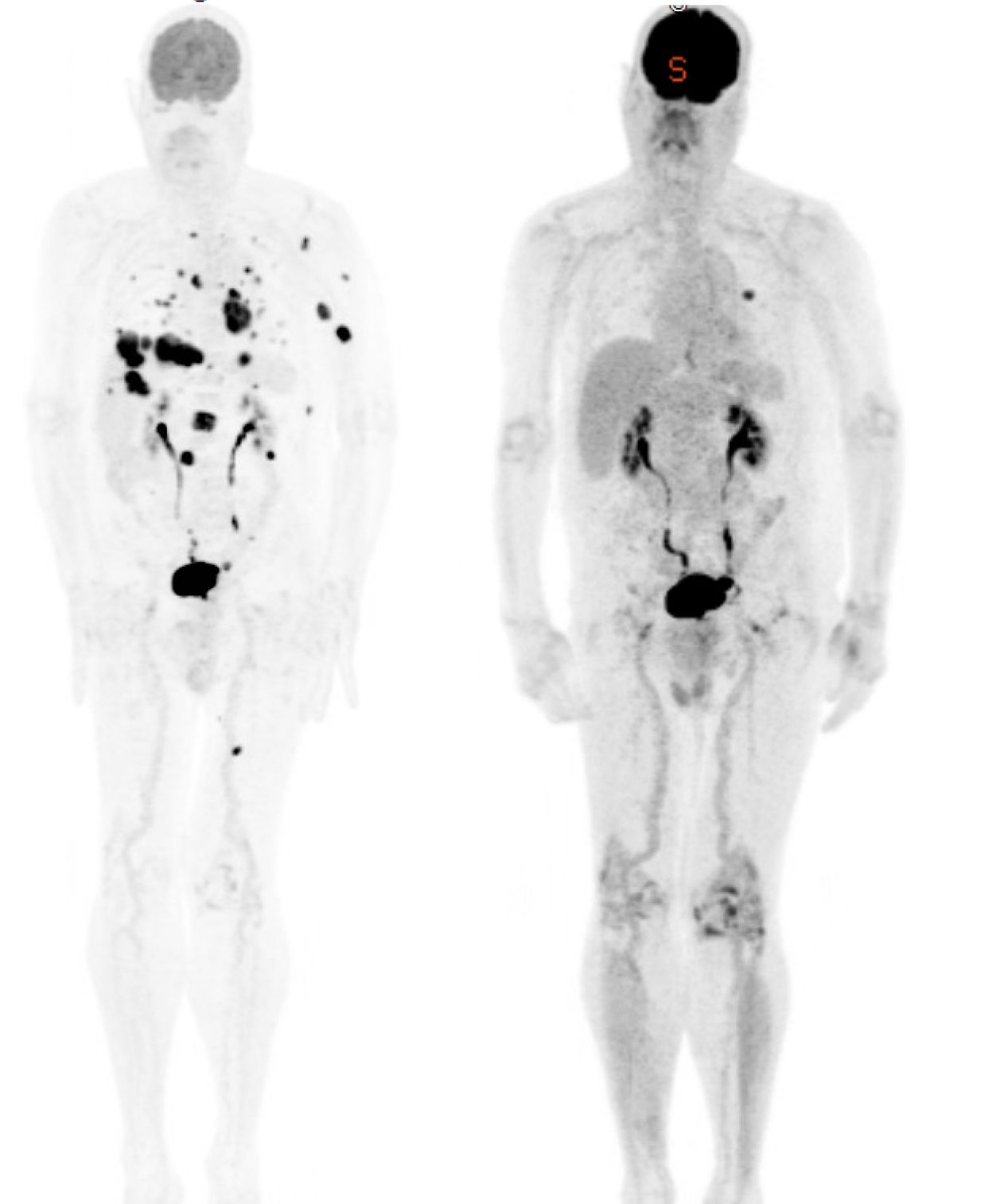Stage 4 Cancer Remission: Your Path to Hope and Healing
A stage 4 cancer diagnosis can feel like the ground has shifted beneath you. One of the first questions patients ask me is: "Can I go into remission?"
Sometimes, yes. Remission doesn't always mean the cancer is gone forever, but it can mean it's controlled - sometimes for years - giving you more time, better health, and a path forward.


Jump to:
- Wondering if remission is possible for you?
- Can Stage 4 Cancer Achieve Remission?
- Monitoring Your Remission: Advanced Blood Tests for Earlier Detection
- Circulating Tumour DNA Testing
- How This Differs From Standard Blood Tests
- Who Might Benefit from detailed blood tests for monitoring cancer treatment response
- Important Context
- Interested in Adding This Layer of Protection?
- Treatment Options for Stage 4 Cancer
- Stereotactic Radiotherapy (SABR/SBRT)
- Understanding Stage 4 Cancer
- Defining Remission in Cancer
- Frequently Asked Questions About Remission
- What Are Signs of Remission?
- How Long Does Remission Last?
- Is a Cure Possible for Stage 4 Cancer?
- What Happens if Remission Ends?
- Support and Resources for Patients
- How Dr. James Wilson Supports Your Journey to Cancer Remission
- Taking the Next Step Toward Remission
Wondering if remission is possible for you?
Let's talk about your options. Dr James Wilson sees patients within 48 hours - often the same day. Video or in-person consultations available.
Book nowBeing told that you have stage 4 cancer can feel like a lot to take in. Whether you've just been told or you're exploring treatment options after initial cancer treatment, you're likely asking: can stage 4 cancer go into remission?
'Remission' is not a term I often use - it's rarely used in the types of cancer that I treat. It is, however, a term that cancer patients frequently ask me about. The short answer is: sometimes, yes. While cancer remission may not mean a cure, it can mean more time, better control, and improved quality of life.
This website page offers clear, compassionate answers about stage 4 cancer remission, emerging cancer treatment approaches, and how personalised cancer care from a consultant oncologist like Dr. James Wilson may help you or your loved one take the next step with confidence.
Can Stage 4 Cancer Achieve Remission?
While not all stage 4 cancer types respond in the same way, partial remission or even complete remission for a period of time is possible, especially when newer treatments are considered alongside conventional care. By 'remission' in this context, we are referring to a situation where there are no new sites of metastatic cancer appearing on scans and the spots that we know about are controlled. This suggests that the cancer cells, wherever they are in the body, are responding to treatment.
Some cancers, such as stage 4 breast cancer, stage 4 lung cancer, colorectal cancer (bowel cancer, colon cancer), stage 4 colon cancer, ovarian cancer, and non-small cell lung cancer, may respond particularly well to targeted therapy, clinical trial therapies, or stereotactic radiotherapy, especially when the disease is limited to a small number of areas (oligometastatic disease).
Factors influencing remission include:
-
Type of cancer and its genetic makeup
-
Overall health and age
-
Number and size of tumours
-
Access to advanced treatment options
-
Response to previous treatments
Each case is different, which is why a second opinion can be so valuable. Remember that new cancer treatments are emerging all the time and survival for cancer patients with stage 4 cancer is continuing to improve.
Life During Stage 4 Cancer Remission
Remission is not the end of cancer care. In fact, living with stage 4 cancer in remission brings its own set of physical and emotional needs.
You may continue with maintenance therapy, require regular review appointments and physical exams and CT scans, blood tests, and check-ups to monitor for evidence of disease. Some patients live for years with no signs of active disease on scans, especially when the cancer is stable or slow-growing.
While cancer treatment side effects may reduce, you may still need support for:
-
Fatigue, anxiety or depression
-
Managing treatment decisions
-
Connecting with support groups and counselling services
-
Finding the right balance between hope and realism
Many cancer patients find this period a chance to focus on quality of life, reconnect with loved ones, and reclaim a sense of control. Your team should discuss the cancer symptoms you should look out for. Don't wait for your next scan if you have a symptom that persists and progresses in severity over time. If you have symptoms of cancer, you must tell your medical team immediately.
Monitoring Your Remission: Advanced Blood Tests for Earlier Detection
If you're in remission or responding well to treatment, one of the most common concerns is: how will we know if the cancer returns?
Standard monitoring typically involves CT scans every few months and physical examinations. These are essential. But there's now an additional layer of surveillance that can potentially detect cancer recurrence months before it would show up on imaging.
Learn how cancer specific blood tests can help with cancer treatment monitoring here.
Circulating Tumour DNA Testing
When cancer cells are active anywhere in the body, they release fragments of DNA into your bloodstream. Advanced blood tests can now detect these tiny amounts of circulating tumour DNA (ctDNA) at the molecular level.
For patients with stage 4 cancer in remission, this means:
-
Earlier warning if cancer returns – ctDNA may be detectable before tumours reach a size visible on CT scans
-
More frequent monitoring – blood tests between your routine scans can provide additional reassurance
-
Real-time treatment response tracking – if you're on maintenance therapy, blood tests can show whether it's working at the molecular level
-
More treatment options – catching cancer recurrence earlier often means more choices and better outcomes
How This Differs From Standard Blood Tests
Unlike routine blood counts or traditional tumour markers, liquid biopsy technology specifically looks for the genetic signature of your cancer. It's not measuring general markers that can be elevated for other reasons – it's detecting actual DNA from your tumour cells.
This makes it far more sensitive and specific than conventional blood tests.
Who Might Benefit from detailed blood tests for monitoring cancer treatment response
You might consider ctDNA monitoring if you:
-
Feel anxious between scans and want additional reassurance
-
Have a cancer type with higher recurrence risk
-
Want to take the most proactive approach possible to surveillance
-
Are on maintenance therapy and want to track its effectiveness
-
Have oligometastatic disease that's been treated with stereotactic radiotherapy
Important Context
These blood tests supplement your regular imaging and clinical follow-up – they don't replace CT scans, MRI, or appointments with your oncologist. Think of them as an extra layer of protection between your routine scans.
Testing is typically done every 3-6 months, and results are reviewed in a detailed consultation where we discuss what they mean for your ongoing care.
If monitoring indicates possible progression, we'll arrange urgent imaging to locate and confirm any recurrence, then discuss your treatment options – which may include revisiting stereotactic radiotherapy, adjusting drug treatments, or exploring clinical trials.
Interested in Adding This Layer of Protection?
ctDNA testing isn't right for everyone, but it may give you more control over your remission journey. Book a consultation to discuss whether advanced blood monitoring makes sense for your situation.
Learn more about cancer blood testing for monitoring and treatment planning here
Or book a consultation with Dr James Wilson to find out how ctDNA blood testing may help in monitoring your response to cancer treatment - wherever you are in the UK.
Book nowTreatment Options for Stage 4 Cancer
If remission is your goal, the right treatment plan matters. Alongside established options such as Chemotherapy and Immunotherapy, newer techniques may offer a more targeted, less invasive approach. Your cancer care team should sequence drug treatments with local treatments, such as radiation therapy, to get the best results for you.
Stereotactic Radiotherapy (SABR/SBRT)

Dr. Wilson specialises in stereotactic radiotherapy — a highly precise form of radiation used to treat oligometastatic or oligoprogressive disease. It delivers high-dose treatment to small areas, potentially controlling the disease for longer, with fewer side effects. SABR can be used to treat the original site of the cancer as well as any of the part of the body with a sign of cancer on scans.
This may be appropriate if:
-
The cancer has spread, but only to a few sites
-
Previous treatments have worked in some areas, but not all
-
There are a small number of areas of cancer recurrence
-
There has been a period of time between your primary treatment and the cancer coming back
-
You are fit enough for a focused, outpatient-based procedure
-
The size of the tumour permits this type of radiation therapy

Other treatment options that may support remission:
-
Targeted therapy based on genetic testing - certain genetic mutations present in the cancer cells, but not the normal cells can be targeted with specific drug treatments.
-
Hormone therapy (e.g. for prostate cancer or hormone receptor-positive breast cancer)
-
Immune checkpoint inhibitors (immunotherapy), which help your immune system recognise and attack cancerous cells
-
Clinical trials exploring new drugs or combinations
-
Palliative care that improves comfort while slowing disease
In the following image - a PET scan of one of my patients with Stage 4 cancer at diagnosis on the left and after treatment with immunotherapy on the right. A small nodule in the lung that didn't respond was treated effectively with stereotactic radiotherapy (SABR). At the time of writing, he remains in remission with no signs of cancer on his recent scans.

Understanding Stage 4 Cancer
Understanding the different stages of cancer can be confusing - particularly if you've been told that your primary tumour has spread. If you're still coming to terms with the cancer diagnosis, this resource may help: learn more about stage 4 cancer. You can learn all about lung cancer staging here.
In short:
-
Stage IV (stage 4) means the cancer has spread from its primary tumour to other parts of the body
-
The aim of treatment may shift from cure to control, comfort, and long-term health
-
Remission is still possible, especially with an individualised approach that combines different treatments at different times
-
Even those with an advanced stage of cancer can access a support system that can keep them feeling well for longer. Overall survival rates for people with advanced cancer are improving all the time
Cancer staging is determined through a combination of imaging (such as CT scans and positron emission tomography [PET] scans), biopsies, and blood tests. The staging system helps doctors assess how far the cancer has spread and guides your care. While the treatment of early-stage cancer may just require surgery, stage 4 cancer often requires a combination of drug treatment and other local therapies - treatments that complement each other to optimise results.
Defining Remission in Cancer
Remission means that signs of cancer are reduced or no longer detectable. It doesn't always mean the cancer is gone forever, but it does mean it's currently under control - hopefully for a long time. People use the term remission in different ways. I've heard the following terms used to describe the types of remission:
Complete remission: No visible signs of cancer on scans or tests
Partial remission: The cancer has shrunk or is no longer causing symptoms
You may hear the term "no evidence of disease (NED)" — this is often used to describe complete remission, though microscopic cancer cells may still remain. It is therefore important to have clinical follow-up with physical exams and CT scans to identify any sites of cancer recurrence before symptoms of cancer develop.
Frequently Asked Questions About Remission
What Are Signs of Remission?
-
Scans show tumour shrinkage or disappearance
-
Tumour markers or blood tests improve
-
Symptoms reduce (e.g. less pain, better energy, weight stabilisation)
How Long Does Remission Last?
It varies. Some remain in remission for months, others for years. Careful monitoring is essential. Some long-term cancer survivors remain in complete remission for many years. While rare, spontaneous remission has been documented in some cancer patients, although this remains poorly understood and cannot be predicted or relied upon. Spontaneous remission has been seen in people with kidney cancer and certain other cancer types.
Is a Cure Possible for Stage 4 Cancer?
In rare cases, yes, particularly for some blood cancers, testicular cancer, or Hodgkin lymphoma. But most remissions are viewed as long-term control rather than cure. I am very cautious of using words like 'cure' in stage 4 cancer and prefer to discuss long-term control. I will make every effort, and leave no stone unturned, to help my patients control their stage 4 cancer for as long as possible.
What Happens if Remission Ends?
If the cancer returns (cancer recurrence), treatment can be adjusted. This may include revisiting treatment options like stereotactic radiotherapy, cancer trials, or new drugs. The aim is to use different treatments to prolong periods of remission. Involving the palliative care team doesn't always mean that end-of-life care is needed. It can mean that symptoms of cancer need addressing to keep you on active treatment for longer.
Support and Resources for Patients
Whether you're a cancer patient or supporting a family member, cancer remission comes with practical and emotional needs. Consider connecting with:
-
A cancer support group or social worker
-
Counselling for mental health and wellbeing through cancer chat services
-
Depending on your cancer type there are specific support groups available e.g. for pancreatic cancer, liver cancer, metastatic breast cancer, rectal cancer, or skin cancer
-
Trusted resources like Macmillan, the American Cancer Society and the National Cancer Institute
These sites offer reliable treatment guidance, cancer statistics, and help you understand what others in your situation have experienced.
Support from a social worker, counsellor, or dedicated cancer care team can also make a meaningful difference — particularly when navigating complex treatment decisions.
How Dr. James Wilson Supports Your Journey to Cancer Remission
With years of experience treating primary cancer and advanced cancer, Dr. Wilson offers patients access to:
-
Fast second opinions with consultant-led care
-
Precision-led treatment plans tailored to your cancer staging and cancer type
-
Specialist techniques like stereotactic radiotherapy for metastatic cancer
-
A responsive, compassionate healthcare team
-
Guidance that respects your goals and preferences
-
Collaboration with healthcare providers to provide truly holistic care (e.g prompt dietician support to counteract health concerns such as weight loss)
Whether you need breast cancer treatment, lung cancer treatment, or other specialised cancer care, Dr. Wilson takes an individualised approach to each patient.
Read more about his approach to Personalised Medicine.
Taking the Next Step Toward Remission
If you're reading this, you're already taking control. The next step is a conversation. Dr Wilson sees patients within 48 hours - often the same day if needed. What would you ask him?
A second opinion can help you:
-
Understand all your treatment options
-
Explore therapies not yet offered by your team
-
Make informed decisions with clarity and confidence
You’re welcome to book a consultation — even if just to ask “Is there something we’ve missed?”
Dr. James Wilson sees patients in London private medical centres or remotely via video consultation.
Appointments are available the same or next day if an urgent appointment is required.
Take the next step towards hope and healing. Book a consultation with Dr. James Wilson to discuss your stage 4 cancer journey and explore personalised treatment options.
Book now